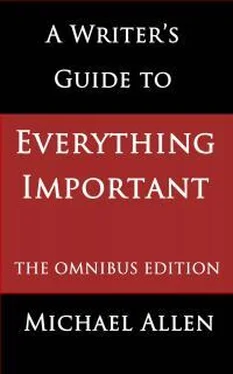Making readers feel such emotions is the most important aspect of a fiction-writer’s craft. Emotion is what holds the reader to the page (‘I couldn’t put the book down’), and it is the emotion conveyed by the final few pages that prompts the reader to recommend a book to their friends. In short, if you want to succeed as a fiction writer, learn how to generate emotion in your readers.
What you are reading now is a book that will help you to do just that. The principal aim of this present ebook is to make you aware of the central role of emotion in anything that might reasonably be called creative writing. Understanding what emotion is, how it is generated in life, and, above all, how to generate emotion in your readers is absolutely essential if a writer is to achieve success – and this is true however you choose to define the word success.
Who is likely to benefit from reading this book?
Anyone with an interest in writing fiction, whether it’s a short story or a multi-volume saga. In addition, anyone who writes for the theatre, television, or film will find here much food for thought.
2. About the author
If you are presented with a book that calls itself a writer’s guide to something or other, you may reasonably wonder just who is the author of said book, and what makes him any sort of authority. All I can do to answer that is tell you a little of my personal history.
At the time of writing I am 74 years old. I was first paid for writing for a weekly magazine in 1955. My first novel was published in 1963, exactly 50 years ago this year, since when I have written at least 25 others (under my own name and several pen names).
I have written half a dozen non-fiction books, most of them intended to be of help to writers. In related fields, I have written various drama scripts which have been professionally produced on the stage, radio, and television.
For about 25 years I was a director of two small publishing companies, and hence saw something of the book world from a publisher’s perspective as well as an author’s.
As of today I have about 60 separate publications available in Kindle format, under various names.
I am an Englishman, and most of my experience has been in UK publishing; many of the examples that I give will therefore be from an English context (though the rest of the world doesn’t behave any differently). All spelling follows English conventions: colour instead of color, for example.
I was never a full-time writer, and my working life was spent in education; as a result, my instinct is always to pass on useful information. In addition to that, I have never forgotten that in 1958, a Professor at Cambridge University remarked to me that, if you ever do any research, you should always publish your results – otherwise your efforts are wasted. I agree. That’s why I’ve taken the trouble to write this book.
3. The need for clear thinking
If you have clicked on Amazon’s Look Inside facility, and read as far as this, you are clearly someone with an ambition to write something. You may well have embarked on, and even completed, several projects already.
Excellent. You have done quite a lot of hard work already. I am now going to ask you to do one very small piece of additional work.
I am really not going to ask you to do anything very difficult. Honest. But I do believe that thirty seconds of thinking, at this stage, and another thirty seconds later on, might possibly prove beneficial.
I suggest that you now write down on a piece of paper an answer to the following question:
When I write a novel (or a short story, or a script), what exactly am I trying to do? What is my main purpose?
And it’s perfectly all right, at this stage, to write down ‘Haven’t a clue.’ Lots of writers go through an entire lifetime without having much clue about they’re really trying to do, and some of them are quite successful.
4. Why is this man talking about emotion anyway?
My own interest in emotion began, I am surprised to remember, when I was still a teenager. No doubt, like most teenagers, I was a seething mass of emotions anyway, but when I think back I believe that my interest in researching this subject was aroused by two things.
First, I was at that time being taught about Aristotle’s theory of tragedy as part of my English ‘A’ level studies; and, second, I was very interested in jazz.
Aristotle, you may recall, had a theory that tragedy in the drama brings about the purification (catharsis) of such emotions as pity and fear. However, I probably did a lot more reading about jazz than about Aristotle. One of the ideas about jazz which was current when I was a teenager was that, since jazz is a musical form which can accommodate almost unlimited improvisation by a solo musician, it is possible for such a musician to express his emotions instantaneously.
At that time (and I was very young, remember) I took the view that the expression of emotions as felt by the ‘artist’ was an important matter. I was, in short, a pompous twit. (‘And you still are,’ I hear a chorus of voices cry.)
Well, when we’re young we all do and believe silly things, and if it’s any help I can say that I now hold the precise opposite of my teenage view. In other words, I now think that it doesn’t matter a damn what the ‘artist’, or writer, or performer, or actor, is feeling when she writes or performs; what matters, above all, is what the audience feels.
But more of that later. For the moment, please note that what I am trying to do in this ebook is explain to you what I believe constitutes a sound and sensible principle on which to base your writing career – seeing as how you seem hell-bent on having one. I am trying to give you an idea of what you should – in my opinion – be trying to do. If you choose to carry out some of the suggestions that I am going to make, you will, in my view, substantially improve your chances of achieving whatever it is you want to achieve through your writing career.
Of course, you are entirely free to ignore what I say. If so, good luck to you. But don’t blame me if you end up wasting several years of your life.
5. Sources of ideas on emotion
I cannot claim that there is much in this chapter which I can describe as original thought. I have relied heavily upon the research and ideas of other writers, scientists, and thinkers.
Given my long-standing interest in emotion, I have made it my business, every ten years or so, to do a brief survey of what science has learnt about emotion in the period since I last researched the subject. As we shall see, this has usually been precious little, because emotions do not readily lend themselves to scientific analysis; as a consequence, few academic researchers have bothered to go down what was obviously a dead end in career terms. Nevertheless, I have occasionally found a useful book on the subject, and I shall refer to these below.
Furthermore, it may be that everything I have to say on this subject strikes you as being perfectly obvious. If so, I can only say that the truths expounded here were once far from obvious to me.
The one virtue which I can perhaps claim is that, so far as I am aware, there have been very few previous attempts to relate the scientific findings about emotion to the craft of writing; and none of them have been recent.
The main previous attempt was that undertaken by an American, Thomas H. Uzzell. In my early twenties I was fortunate enough to be introduced to Uzzell’s book Narrative Technique , which was first published in 1923 and revised in 1934. Uzzell himself was heavily influenced by Professor Walter B. Pitkin of Columbia University, and Pitkin in turn drew on the critical writings of Edgar Allan Poe.
Читать дальше












